The comments in Tuesday's blog got me thinking about James Blish's excellent novel A Case of Conscience, in which a Jesuit priest visiting an alien civilisation finds that they have no religion, leading to a crisis of faith.
I then went on to think about Arthur C. Clarke's wonderful short story The Star, which is about a different Jesuit priest in space and a different crisis of faith. I really recommend reading this one, actually. It was good enough to be made into an episode of The Twilight Zone. And it's only short.
From there I began to ponder some other religious conundrums which have popped up in science fiction over the years, and which may eventually become reality.
For example:
• Religious holidays are usually based on the Earth's lunar or solar cycles. So how would these be maintained for adherents living on other planets?
• Suppose a replicating machine were able to produce a pork chop, indistinguishable at the molecular level from a real pork chop, but completely artificial and not extracted in any way from a real pig. Would it be OK for Muslims and Jews to eat it?
• In a cybernetic future, where anyone has the ability to have their consciousness uploaded into a network and effectively live forever, what happens to the Christian idea of eternal life as a reward for the faithful?
In fact, all this opens a much wider, and more general question, which is about how religions in general absorb advances in knowledge and technology.
Often they just reject them out of hand, like the Creation Museum in Kentucky, which claims that the Earth popped into existence 6,000 years ago. Alternatively, they try to limit the building of such knowledge in the first place, hoping that the question never gets asked. Like George Pell's recent stance on stem cell research.
But that's probably another blog for another time.



3 comments:
With the replicating question I'd say they would not. With no research done at all I think that replicated food would probably violate another religious food taboo. I'm intrigued now... will check it out
Bloody God Bloggerer!!
Whatever "eternal life" means, and a lot of us have no real idea, traditional Xtianity would say that the 'consciousness' without a body is about as useful and lifelike as the other way round. Life requires both body and "spirit" to be happening.
The other questions, believe it or not, are already being played with by theologians and ethicists. I'll stop playing minister boy now.
Post a Comment